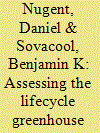| Srl | Item |
| 1 |
ID:
127211


|
|
|
|
|
| Publication |
2014.
|
| Summary/Abstract |
This paper critically screens 153 lifecycle studies covering a broad range of wind and solar photovoltaic (PV) electricity generation technologies to identify 41 of the most relevant, recent, rigorous, original, and complete assessments so that the dynamics of their greenhouse gas (GHG) emissions profiles can be determined. When viewed in a holistic manner, including initial materials extraction, manufacturing, use and disposal/decommissioning, these 41 studies show that both wind and solar systems are directly tied to and responsible for GHG emissions. They are thus not actually emissions free technologies. Moreover, by spotlighting the lifecycle stages and physical characteristics of these technologies that are most responsible for emissions, improvements can be made to lower their carbon footprint. As such, through in-depth examination of the results of these studies and the variations therein, this article uncovers best practices in wind and solar design and deployment that can better inform climate change mitigation efforts in the electricity sector.
|
|
|
|
|
|
|
|
|
|
|
|
|
|
|
|
| 2 |
ID:
117858


|
|
|
|
|
| Publication |
2012.
|
| Summary/Abstract |
In recent years, studies have challenged the conventional power-based literature to show that a deficiency in resources does not limit a small state's bargaining leverage in international negotiations. However, few studies examine small state influence during compliance bargaining, the post-agreement bargaining to ensure that all signatories comply with the terms of an agreement. Using an interview with a key advisor to the small twin-island state of Antigua and Barbuda during compliance bargaining with the United States (US), and World Trade Organization (WTO) documents, this article examines how a small state can successfully attain bargaining leverage and win against a behemoth state. In this case, Antigua successfully challenged the US ban on cross-border internet gambling and betting services. The article argues that the strategies and tactics that Antigua used within the WTO dispute settlement framework contributed to the country's bargaining leverage and enabled it to punch above its weight.
|
|
|
|
|
|
|
|
|
|
|
|
|
|
|
|